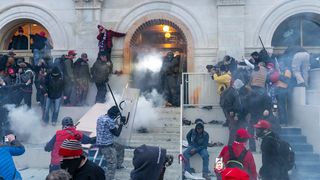During the final presidential debate, Donald Trump told white supremacists and the notorious Proud Boys to "stand back and stand by". This week they stood up and embarrassed the United States before the eyes of the world.
The images of MAGA rioters occupying the House of Representatives, ransacking Nancy Pelosi's office and flying Trump flags over a Capitol Building with inauguration bleachers at the ready and full of rioters, will endure. They will contribute an indelible stain not only on the Trump presidency but on the stock of democracy globally.
How the United States reached this point will be fodder for historians in the decades to come, but for the most part it has happened in the open and in real time.
Democracy in the United States is flourishing and teetering
On paper, the 2020 US elections are a triumph for democracy and the rule of law. More than 159 million Americans — more than two-thirds of eligible voters — cast votes, the highest voter turnout rate since 1900.
Courts heard and decided numerous challenges to state and local electorate processes both before and after the election. Election Day and the contentious days that followed were almost universally peaceful. Cybersecurity officials declared the elections the most secure in recent history.
Even before the anti-lockdown and Black Lives Matter protests of 2020, participation in the 16,000 protests in the first three years of Trump's term was likely higher per capita than during the US Civil Rights Movement of the mid-20th century.
But the passion that drove massive voter turnout in the election cuts two ways, a testament to democratic vibrancy, but also a driver of dissent and the violent protests that unfolded in Washington this week.
Protest is a feature of the Trump era. Even before the anti-lockdown and Black Lives Matter protests of 2020, participation in the 16,000 protests in the first three years of Trump's term was likely higher per capita than during the US Civil Rights Movement of the mid-20th century.
First the good
Participation in protest is a well-known motivator for broader political involvement, including voter turnout and seeking office.
The Civil Rights Movement inspired generations of future Black American politicians. Democratic Congresswoman Alexandria Ocasio-Cortez cites attending a protest at the Standing Rock Reservation in North and South Dakota as the tipping point for her running for office in 2017.
It was the 2014 Ferguson protests that motivated now-member of Congress Cori Bush to get involved in the political process. A sustained grassroots effort born of protest helped Democrats win two Senate seats in Georgia the day before the violence in Washington.
One reason for the sustained activating effect of protests and rallies is the formation of social networks. People who attend these events meet and interact with others who share their grievances and their willingness to act.
Now the bad
But not all political activation is socially desirable.
The ease of social networking means that radical conspiracy theories can find larger audiences than they would otherwise and catalyse online communities into real, active social and political movements. And this can lead to fundamentally alarming outcomes.
The Capitol Hill insurrection and its violence was a vivid example of the undesirable consequences of "low-cost" tools of mobilisation being available to radical groups.
Organised protest has been a hallmark of Trump's support base for years.
Many of those who participated in the January 6 violence have been linked to the hundreds of anti-lockdown protests in 2020. Many more are veterans of Trump rallies — events defined by their ceaseless nature of protest (against the media, Mueller, Democrats, Republicans, the Deep State, water pressure and so on).
A constant thread in Trump's political life has been his cavalier attitude towards violence, espousal of dangerous conspiracy theories and his equivocal responses to clear and growing white supremacy movements.
But a constant thread in Trump's political life has been his cavalier attitude towards violence, espousal of dangerous conspiracy theories and his equivocal responses to clear and growing white supremacy movements.
He notoriously urged police to "rough up" protesters, issued racially charged calls to respond to looting with "shooting" and he has failed to condemn white supremacy in any real terms.
Trump urged his followers to come to Washington as Congress certified the electoral college results.
"Be there. Will be wild", he tweeted.
At a rally presaging the assault on the Capitol, his personal lawyer Rudy Giuliani encouraged "trial by combat".
An unmistakable call to arms
For those among the rally who accept violence as a political tool, including those wearing "January 6 Civil War" paraphernalia , this was an unmistakable call to arms.
While many have warned of an outcome like this since 2015, the pathway to political violence became the most evident throughout 2020.
In June, gun-wielding protestors and militia members stormed the state of Michigan's legislature as it debated extending COVID-19 statewide lockdowns. Subsequently, a session of the legislature was cancelled due to active threats of a more intense repeat protest affording the protesters an emboldening perception of power.
President Trump contributed to this sense when — instead of condemning the calls for violence and executions — he urged the target of the threats, Governor Gretchen Whitmer, to negotiate with those making them.
Four months later, militia members who attended the June protests were arrested for a terror plot to kidnap Whitmer and to set off bombs around the state. Again, President Trump minced his words, saying he doesn't accept violence, but that Whitmer was doing a terrible job and should thank him for the federal arrests.
Authorities will no doubt have these precipitating events in mind as they search for and deal justice to those who stormed the Capitol this week.
Even before these radicalising events, right-wing extremism accounted for two-thirds of domestic terror attacks and plots in the United States in 2020.
The damage is done
But the damage is done. The tens of thousands who descended on Washington are at once jubilant in the knowledge that they controlled the halls of American power for a brief moment and outraged that it didn't change the eventual outcome.
Having tasted the power and attention delivered by embracing political violence, will they be deterred by criminal prosecutions and demotivated once Trump is no longer president?
Or do these movements — and their acceptance of violence as a tactic — outlast Trump, spurred on by Democratic control of White House, Senate and House.
Notably, the events in Washington on January 6 were not isolated.
Large "stop the steal" protests forced Capitol buildings in several other states to be evacuated. Those Capitol Hill protesters will disperse back to their home states, emboldened, "battle hardened" and bringing the knowledge that their grievances and willingness to act has broad geographic support.
The implications for domestic security in the United States over the near to medium term are immense.
A Republican Party in disarray
President Trump knows his tolerance for chaos is unique among the country's elected officials.
Trump used his transgressiveness and unconventionality to bend the Republican Party to his will. He has rewarded loyalty and delivered retribution for disloyalty. Now that Trump is leaving office, with political insurrection one of Trump's legacies, many institutional Republicans are exposed to mighty cross-pressures.
The violence in the Capitol proved too much for too many, like South Carolina senator Lindsey Graham who said after years of Trump support, "count me out".
Graham's return to his 2015 anti-Trump position comes after he secured another six-year term in the 2020 election, but also coincided with two stunning Senate election losses in Georgia and the realisation that Trump can also be an electoral liability.
With control of the US Senate now in Democratic hands, Trump goes down in the history books not just as a losing one-term president, but joining Herbert Hoover as also presiding over the loss of the House of Representatives and the Senate in a single term of office.
With control of the US Senate now in Democratic hands, Trump goes down in the history books not just as a losing one-term president, but joining Herbert Hoover as also presiding over the loss of the House of Representatives and the Senate in a single term of office.
In the US Senate, when proceedings resumed late on Wednesday, just a handful of Republican senators supported efforts to set aside the presidential elections.
But a different picture emerged in the House of Representatives where over 130 Republicans, more than half the party's elected members in the chamber, voted to object to the election of Joe Biden.
In short, the Republican Party is starkly divided, soon to be without control of any governing institution in Washington.
Trump's hold over the base of the party, even after the events of this past week — or past four years — give Trump power like few losing presidents ever have. His approval rating among Republicans consistently nears 90 per cent and many expect him to run again for president in 2024.
Much turns on what Trump does with that power — preserving it or letting it drain away — which will in turn depend on Trump's own reckoning with the political violence he spurred.
The clear and present danger to American democracy
President Trump has consistently ceded credibility and legitimacy to unconventional and even dangerous social and political movements. It seems implausible that he will cease to do so now.
Perpetuating the falsehood that the 2020 election was stolen from him — and his supporters — is key to Trump's strategy for remaining politically relevant in the months and years ahead. An overwhelming 88 per cent of Trump voters say they don't believe that Biden legitimately won the election.
Trump condemned the violence on Capitol Hill on Thursday evening, reading from a teleprompter in an edited video address. But he also told his supporters "our journey is just beginning".
Where this journey leads an unbridled Trump and his supporters — their appetite for political violence and the reaction of Republican elites — will have the gravest consequences for democracy in the United States and around the world.







